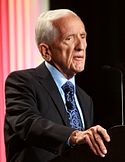T. Colin Campbell Quote
My friend David Kritchevsky, who was probably the leading researcher in this area until his death, found40 that protein of animal origin is more cholesterolemic [leading to higher cholesterol in the bloodstream] and atherogenic [contributing to heart disease] than protein of plant origin for rabbits, citing several studies41—a distinction between types of protein that was first noted in regard to atherosclerosis more than sixty years ago.42 He found the same to be true for humans, as well.43 We observed a similar distinction between soy and casein protein (the principle protein in milk) in my lab when they were compared in our studies on experimental cancer with rats.
T. Colin Campbell
My friend David Kritchevsky, who was probably the leading researcher in this area until his death, found40 that protein of animal origin is more cholesterolemic [leading to higher cholesterol in the bloodstream] and atherogenic [contributing to heart disease] than protein of plant origin for rabbits, citing several studies41—a distinction between types of protein that was first noted in regard to atherosclerosis more than sixty years ago.42 He found the same to be true for humans, as well.43 We observed a similar distinction between soy and casein protein (the principle protein in milk) in my lab when they were compared in our studies on experimental cancer with rats.
Related Quotes
About T. Colin Campbell
Thomas Colin Campbell (born March 14, 1934) is an American biochemist who specializes in the effect of nutrition on long-term health. He is the Jacob Gould Schurman Professor Emeritus of Nutritional Biochemistry at Cornell University.
Campbell has become known for his advocacy of a low-fat, whole foods, plant-based diet. He coined the term "Plant-Based diet" to help present his research on diet at the National Institutes of Health in 1980. He is the author of over 300 research papers and four books: The China Study (2005), which was co-authored with his son, Thomas M. Campbell II, and became one of America's best-selling books about nutrition, Whole (2013), The Low-Carb Fraud (2014) and The Future of Nutrition: An Insider's Look at the Science, Why We Keep Getting It Wrong, and How to Start Getting It Right (2020). Campbell is featured in the 2011 American documentary Forks Over Knives.
Campbell was one of the lead scientists of the China–Cornell–Oxford Project on diet and disease, set up in 1983 by Cornell University, the University of Oxford, and the Chinese Academy of Preventive Medicine to explore the relationship between nutrition and cancer, heart, and metabolic diseases. The study was described by The New York Times as "the Grand Prix of epidemiology".
Campbell has become known for his advocacy of a low-fat, whole foods, plant-based diet. He coined the term "Plant-Based diet" to help present his research on diet at the National Institutes of Health in 1980. He is the author of over 300 research papers and four books: The China Study (2005), which was co-authored with his son, Thomas M. Campbell II, and became one of America's best-selling books about nutrition, Whole (2013), The Low-Carb Fraud (2014) and The Future of Nutrition: An Insider's Look at the Science, Why We Keep Getting It Wrong, and How to Start Getting It Right (2020). Campbell is featured in the 2011 American documentary Forks Over Knives.
Campbell was one of the lead scientists of the China–Cornell–Oxford Project on diet and disease, set up in 1983 by Cornell University, the University of Oxford, and the Chinese Academy of Preventive Medicine to explore the relationship between nutrition and cancer, heart, and metabolic diseases. The study was described by The New York Times as "the Grand Prix of epidemiology".
